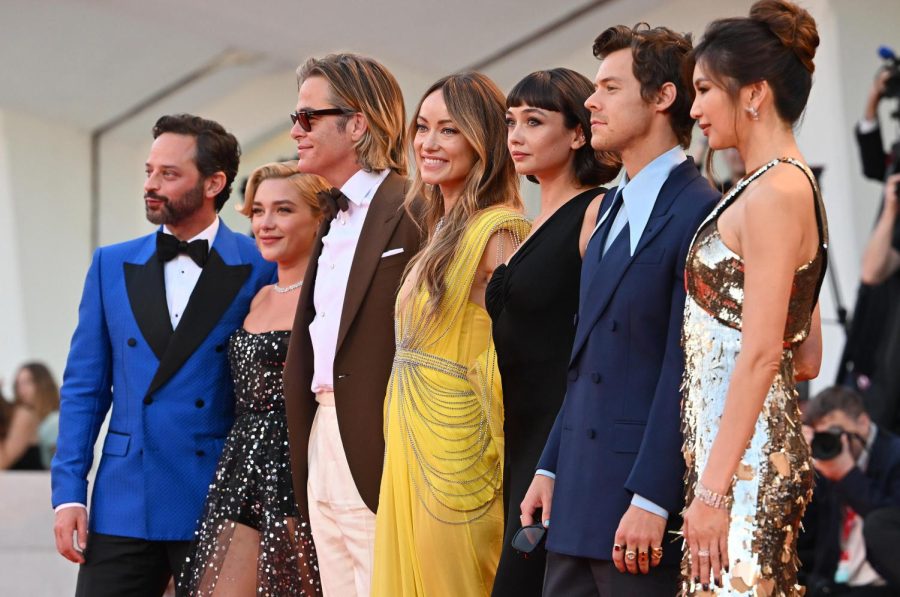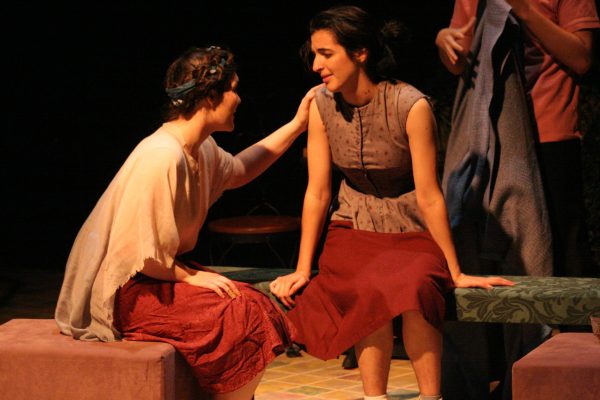Olivia Wilde’s Second Directorial Feature Receives Lukewarm Reviews Ahead of Theatrical Opening
The cast of Don’t Worry Darling on the red carpet.
Olivia Wilde’s second-ever directorial project, Don’t Worry Darling, is scheduled to be released in theaters later this month. However, Don’t Worry Darling’s recent press coverage has had little to do with the film itself and much more to do with the ever-escalating conflict among the production team, cast members, and former cast members.
Face-spitting allegations, social media slights, publicly delivered custody paperwork, age-gap relationships, and musicians-turned-actors — not to mention the peripheral involvement of the always-inflammatory Shia LaBeouf — have crescendoed into a PR nightmare of impressive proportions.
Don’t Worry Darling was first announced in 2019, and the spectacle behind the scenes began not long after. In September 2020, Shia LaBeouf left the cast, citing “scheduling conflicts,” and megastar Harry Styles swiftly stepped into the leading male role. The glam-rock-adjacent ex-boyband member was to star alongside powerhouse actress Florence Pugh, while Chris Pine, Dakota Johnson, and Nick Kroll took on supporting roles.
It seemed like Don’t Worry Darling would be a sure-fire hit thanks to its celebrity-studded cast and the acclaim and commercial success of Olivia Wilde’s directorial debut Booksmart in 2019. However, drama surrounding the film’s production began to stir after Wilde split from her loveable, mustachioed fiancé, Jason Sudeikis, in November 2020. The pair released a statement that they had separated amicably and would continue to co-parent their two children. Two months later, Wilde and Styles were spotted acting like a couple at a wedding, and their relationship was quickly confirmed to be romantic. Some Styles fans criticized Wilde because of the 10-year age gap and because of Wilde’s role as Styles’ director, while others labeled these criticisms as unfair, remarking that countless male directors have engaged in similar relationships. Still other fans dismissed the pairing of Wilde and Styles as an elaborate PR stunt. Needless to say, the couple attracted abundant media attention — Styles’ dating life is a popular subject of scrutiny for Twitter and tabloids alike.
In April 2022, a year after Sudeikis and Wilde split up, Wilde was delivered custody papers from
Sudeikis while delivering a speech about Don’t Worry Darling at CinemaCon in Las Vegas, and the bad blood became obvious.
At around the same time LaBeouf was removed from the project, he was also making disturbing
headlines. His former partner FKA twigs filed a lawsuit against him, citing “relentless abuse” and sexual battery. He had also recently admitted to lying about childhood abuse in his semi-autobiographical film Honey Boy. A month after the news of LaBeouf’s lawsuit, Variety reported that LaBeouf was, in fact, “dropped from the film” due to “poor behavior,” stating that “his style clashed with the cast and crew,” including Wilde, who ultimately fired him.
The legitimacy of this claim would soon be called into question. In August 2022, LaBeouf told Variety that he wasn’t fired at all; he actually “quit the film due to lack of rehearsal time.” LaBeouf substantiated his version of the story with texts and videos from Wilde attempting to convince him to stay in spite of Pugh’s uncertainties about him. So, was Wilde actually protecting her female lead from a volatile and unpleasant costar? Or was she simply trying to safeguard her own image by retelling the story of LaBeouf’s departure to make herself look like the good guy in the eyes of the press?
Pugh did little to defend Wilde against character assassination. She also did little to promote Don’t Worry Darling on her social media, leading many to believe that there had been a falling out between Pugh and Wilde, blossoming into a cold war of sorts. One of the few statements that Pugh made about the film was a complaint about the outsized attention given to her and Styles’ sex scenes.
“When it’s reduced to your sex scenes, or to watch the most famous man in the world go down
on someone, it’s not why we do it,” Pugh said. “It’s not why I’m in this industry. Obviously, the nature of hiring the most famous pop star in the world, you’re going to have conversations like that. That’s just not what I’m going to be discussing because [this movie is] bigger and better than that. And the people who made it are bigger and better than that.”
Fast forward to present day: the cast of Don’t Worry Darling had a tumultuous press panel early this month. Pugh was a no-show. Styles, perhaps one of the most extensively media-trained celebrities in recent history, said ridiculous, ineloquent things about Don’t Worry Darling during interviews, one example being, “My favorite thing about this movie is, like, it feels like a movie.”
Meanwhile, Chris Pine seemed to dissociate as he sported, according to Twitter, a “first female prime minister for a European nation” style bleach-blond bob. Styles and Wilde appeared to keep their distance on the red carpet, which stirred up rumors of a breakup. And, of course, there was “Spitgate,” a video clip in which Styles appeared to spit on Pine, which was dissected to no end on social media. The film festival was an absolute PR disaster.
In the midst of all this scrutiny and hullabaloo, critics have called the movie visually stunning yet
conceptually uninspired. Will all of this media attention make Don’t Worry Darling a more successful piece of media than it would be otherwise? Don’t Worry Darling is a superficially disastrous project, but it’s sensational, and therefore has a kind of twisted success regardless of its quality. In our attention economy where mental focus equals capital, a movie doesn’t have to be good. It just has to be talked about.








